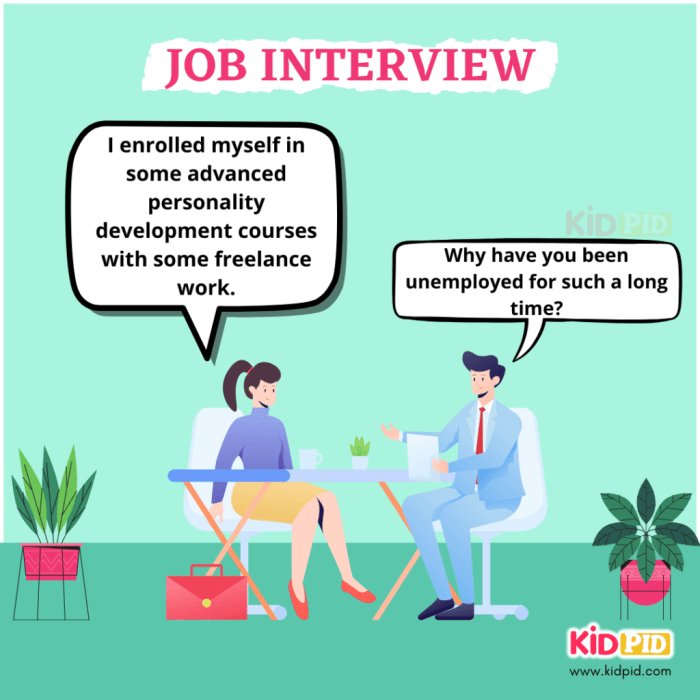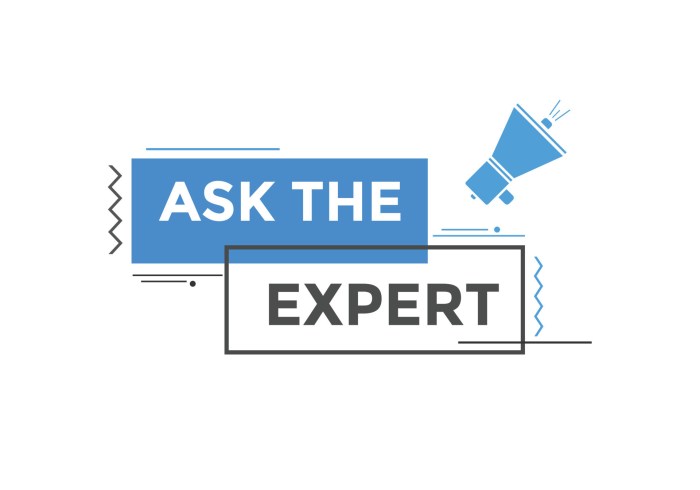
Why you should continue applying for more jobs even after good interview – Why you should continue applying for more jobs even after a good interview? It’s a question many job seekers ponder after a positive initial interaction. The job market is dynamic, and a single interview, no matter how promising, doesn’t guarantee a job offer. This post dives into the reasons why exploring further opportunities is crucial for career advancement and personal growth.
The job market is constantly evolving, with industries experiencing periods of growth and decline. Skill gaps and fierce competition can emerge unexpectedly. This means even with a successful interview, it’s smart to remain proactive in your job search. Applying to multiple jobs allows you to expand your horizons, explore diverse industries, and gain insights into different hiring processes.
You might discover new skills or interests during this exploration. The experience itself can improve your interview skills and refine your approach.
Understanding the Job Market Landscape
The job market is a dynamic and ever-evolving ecosystem. While a strong interview performance is a significant advantage, it’s not a guarantee of employment. Staying informed about current trends, understanding the intricacies of the application process, and adapting to industry shifts are crucial for long-term career success. Continuously seeking new opportunities, even after a successful interview, allows you to explore diverse avenues and potentially discover better fits.The current job market is characterized by both exciting opportunities and fierce competition.
Industries like technology, renewable energy, and healthcare are experiencing significant growth, creating numerous job openings. However, this growth is often accompanied by a need for specific skills, creating a gap between available roles and qualified candidates. Furthermore, the increasing reliance on digital tools and remote work has altered the traditional job application process, demanding adaptability and a proactive approach.
Job Market Trends
The job market is shaped by various factors. Rapid technological advancements are driving demand for specialized skills in areas like data science, artificial intelligence, and cybersecurity. Simultaneously, industries like manufacturing and hospitality are facing challenges related to automation and labor shortages. The shift toward remote and hybrid work models has also impacted the geographical location of job opportunities and the expectations of potential employers.
Competition for coveted roles remains intense, particularly in high-growth sectors. This competitive environment emphasizes the need for continuous skill development and a comprehensive understanding of current market trends.
Application Process Dynamics
The application process has evolved significantly. A well-crafted resume and cover letter are still essential, but employers increasingly prioritize online platforms and applicant tracking systems (ATS). A strong online presence, including a professional LinkedIn profile and a portfolio showcasing your skills, can significantly enhance your candidacy. It’s crucial to understand the specific requirements and preferences of each employer and tailor your application materials accordingly.
Common pitfalls include neglecting to research the company thoroughly, failing to tailor your resume and cover letter, and not following instructions carefully. Addressing these areas for improvement will enhance your application effectiveness.
Staying Updated on Market Conditions
Staying informed about current market conditions is crucial for career advancement. Regularly checking industry news websites, following influential figures in your field on social media, and attending industry events are excellent ways to stay updated. Participating in online forums and communities dedicated to your profession can provide valuable insights and networking opportunities. Following relevant job boards and utilizing professional networking platforms, such as LinkedIn, can help you identify emerging trends and understand the demand for specific skills.
These actions enable you to adapt your skillset and career strategy accordingly.
Industry Hiring Practices Comparison
| Industry | Hiring Practices | Expectations ||—|—|—|| Technology | Emphasis on technical skills, project experience, and problem-solving abilities; often utilize online assessments and coding challenges. | Candidates expected to demonstrate proficiency in specific software, programming languages, and modern technologies. || Healthcare | Strong focus on certifications, licenses, and experience; interviews often emphasize patient care skills and ethical considerations. | Emphasize empathy, communication skills, and a deep understanding of medical practices.
Landing a great interview is awesome, but keep applying! Sometimes, the perfect role isn’t just waiting for you, it’s out there, calling you. Just like a natural born adventurer might be drawn to a new, unexplored path, you might find a role that pushes you further in your career. Think about the 8 surprising signs you might be a natural born adventurer, like a thirst for discovery and a willingness to step outside your comfort zone.
And that’s exactly what you need to do when searching for a job! Keep looking, keep exploring, and you might just find the next incredible opportunity.
|| Finance | Strong emphasis on quantitative skills, analytical abilities, and financial modeling experience; interviews may involve case studies and technical assessments. | Candidates should possess strong analytical skills, a proven understanding of financial principles, and a background in financial modeling. || Education | Value experience with students and classroom management; interviews often assess teaching methods and pedagogical approaches. | Expect candidates to display a passion for education, strong communication skills, and a proven ability to engage students.
|This table highlights some key differences in hiring practices across various industries. Understanding these nuances will help you tailor your application and interview strategies to the specific expectations of each industry.
Evaluating the Value of Multiple Applications: Why You Should Continue Applying For More Jobs Even After Good Interview

Even after a successful interview, the job search isn’t over. Applying for multiple positions continues to be a powerful strategy, offering significant benefits beyond securing a single role. This approach allows for a broader exploration of opportunities and a deeper understanding of the job market landscape. It’s not just about finding a job; it’s about refining your career path and developing a more comprehensive skill set.
The value of multiple applications extends far beyond the immediate goal of landing a job. It allows for a more comprehensive understanding of the nuances within different industries and companies. This in-depth exploration fosters a more informed decision-making process, ultimately leading to a better fit for your long-term career aspirations.
Benefits of Exploring Diverse Opportunities
Broadening your horizons by applying to various roles, even in different industries, provides invaluable experience and insights. Each application, regardless of the outcome, exposes you to new perspectives, different company cultures, and diverse approaches to problem-solving. This multifaceted exposure is crucial for developing a well-rounded skill set and career trajectory.
Advantages of Applying Across Industries
Exploring diverse industries allows for the development of a more versatile skill set. For example, applying for roles in both technology and finance might equip you with analytical skills honed in finance, coupled with the technical proficiency cultivated in the tech sector. This interdisciplinary approach often results in a more adaptable and marketable profile for future opportunities.
Skill Development Through Unsuccessful Applications
Unsuccessful applications, while disappointing in the short term, can offer valuable learning experiences. Analyzing the reasons behind a rejection—whether it’s a mismatch in skills, a lack of experience in a particular area, or an inadequate presentation of your qualifications—provides crucial feedback for refining your resume, cover letter, and interview techniques. Each application serves as a stepping stone, enabling you to identify areas for improvement and to better tailor your approach for future endeavors.
| Industry | Potential Skill Gains (Even with Rejection) |
|---|---|
| Technology | Technical proficiency, problem-solving, adaptability to rapidly changing technologies, project management, communication in a fast-paced environment. |
| Finance | Analytical skills, financial modeling, risk assessment, understanding of financial markets, communication in a high-pressure environment. |
| Marketing | Communication, creativity, customer relationship management, understanding of market trends, campaign development. |
| Healthcare | Patient care, empathy, communication with diverse individuals, problem-solving under pressure, adhering to ethical standards. |
| Education | Teaching methodologies, communication skills, interpersonal skills, patience, and understanding diverse learning styles. |
Identifying Areas for Improvement
A successful job interview isn’t just about a good first impression; it’s about demonstrating alignment with the company culture and showcasing your skills in a way that resonates with the hiring manager. Even after a positive interview, there’s always room for growth and refinement. Identifying and addressing potential areas of improvement can significantly boost your chances of landing the job.
By understanding common pitfalls and implementing effective strategies, you can significantly enhance your interview performance and increase your marketability.Continuous improvement is key to navigating the dynamic job market. Analyzing previous interviews, even those that went well, allows you to pinpoint areas where you can shine even brighter. This proactive approach ensures that you’re not just meeting expectations but exceeding them.
Common Interview Mistakes
Many job seekers, even those with strong qualifications, fall into common traps during the interview process. These errors can sometimes derail a promising candidacy, despite a positive initial impression. Understanding these mistakes allows you to anticipate and address them in future interviews.
- Failing to tailor your responses to the specific job description. A candidate may present themselves well overall but fail to highlight skills and experiences directly relevant to the role. This suggests a lack of preparation and understanding of the employer’s needs. A candidate might mention general project management experience, but not directly address the project management tools or methodologies specifically sought by the hiring manager.
- Lack of clarity and conciseness in communication. Sometimes candidates get lost in long-winded explanations or fail to provide direct answers to the interviewer’s questions. This can lead to a loss of focus and a missed opportunity to convey key strengths. For example, a candidate discussing a project might get sidetracked by irrelevant details, obscuring the key contributions and impact.
- Inadequate preparation for behavioral questions. Many interviewers use behavioral questions to assess a candidate’s past performance and predict future success. Candidates who lack sufficient preparation for these questions may stumble over their responses or fail to articulate their accomplishments effectively. For instance, a candidate asked about a time they faced a difficult challenge in a team setting might struggle to articulate the problem, the solution they implemented, and the positive outcomes achieved.
Landing a good interview is a huge win, but don’t stop there! The job hunt can be exhausting, leading to the dreaded “revenge of the lack of sleep” like this , but keeping your applications flowing is crucial. You never know what opportunities might pop up, and even if you find a great fit, having other options on the table provides a safety net and gives you leverage if the current offer doesn’t quite feel right.
So, keep applying – you never know when a better opportunity will appear.
Strategies for Enhancing Interview Skills
Addressing these issues requires a proactive approach. Strategies for improvement include detailed self-assessment, focused practice, and a critical review of past interviews.
- Practice active listening: Pay close attention to the interviewer’s questions and ensure you fully grasp the context before responding. This demonstrates your engagement and understanding of the role.
- Develop concise and impactful responses: Structure your answers with a clear introduction, body, and conclusion, focusing on the most relevant information and quantifiable results. Use the STAR method (Situation, Task, Action, Result) to organize your stories effectively.
- Prepare for common interview questions: Research frequently asked behavioral questions and develop compelling answers that showcase your skills and experience. Prepare examples from past experiences that align with the interviewer’s questions.
Effective Answer Strategies
This table Artikels potential interview questions and how to answer them effectively, highlighting areas for improvement based on past interviews.
| Potential Interview Question | Effective Answer Strategy | Areas for Improvement |
|---|---|---|
| “Tell me about yourself.” | Briefly summarize your background, highlighting relevant skills and experiences. Focus on accomplishments and career progression. | Avoid rambling or giving a generic overview. Ensure the summary aligns with the job description. |
| “Why are you interested in this role?” | Connect your skills and experience to the specific requirements of the job. Express genuine enthusiasm for the company and its mission. | Avoid a superficial response. Show you’ve researched the company and understand the role’s responsibilities. |
| “What are your strengths and weaknesses?” | Highlight strengths that align with the job requirements. Frame weaknesses as areas for development, showcasing a willingness to learn and improve. | Avoid negative or vague statements about strengths. Be specific and provide examples. |
Leveraging Feedback and Experience
Interviews, even those that don’t lead to a job offer, provide invaluable learning opportunities. By actively seeking and analyzing feedback, you can refine your approach and significantly improve your future applications. Understanding the specific areas where you excelled and where you could have performed better allows for a tailored and impactful strategy for subsequent interviews. This iterative process allows for consistent growth and a more confident presentation.
Utilizing Interview Feedback
Effective feedback utilization involves a thorough review of past interview experiences, not just focusing on the outcome. Identifying specific areas where the interview process could have been improved is crucial for future success. This includes evaluating the entire interview process, from initial preparation to follow-up interactions. Detailed notes about strengths and weaknesses observed during the process help create a comprehensive strategy for future applications.
Tailoring Applications and Presentations
Utilizing past interview experiences to refine future applications and presentation strategies involves a thoughtful analysis of what worked and what didn’t. For example, if you received feedback highlighting a strong communication skill, emphasize this aspect in future applications by including specific examples and anecdotes. Conversely, if you received feedback suggesting improvement in technical knowledge, dedicate more time to reviewing relevant technical materials and practice related questions.
This personalized approach ensures a stronger connection with the employer.
- Strong Communication Skills: Emphasize specific instances of clear and concise communication in your application materials, highlighting how your communication style aligns with the company’s values and the specific role requirements. For example, “In my previous role, I successfully managed a complex project by clearly articulating the project plan and progress to stakeholders.”
- Technical Proficiency: Showcase relevant technical expertise by incorporating examples of problem-solving in your application materials. If feedback pointed to a lack of knowledge in a particular area, dedicate time to learning and practicing that skill. This can involve taking courses, reading technical documentation, or practicing problem-solving scenarios.
- Adaptability and Problem-Solving: If you received feedback suggesting you need to enhance your problem-solving abilities, focus on providing concrete examples of situations where you successfully identified and resolved issues in previous roles. Highlight your ability to adapt to changing circumstances. “I was able to quickly adapt to a new software program by researching online tutorials and seeking guidance from colleagues.”
Adapting Interview Strategies
Adapting interview strategies involves a proactive and reflective approach to past experiences. Identifying and addressing weaknesses from previous interviews is critical to building a more robust and effective interview strategy. This might involve practicing different types of questions or preparing more thorough answers. The aim is to proactively address areas for improvement to confidently answer questions and impress the interviewer.
Summary of Interview Feedback
| Category | Common Feedback | Actionable Steps |
|---|---|---|
| Communication | Vague answers, poor articulation, lack of clarity | Practice concise and structured answers, use specific examples, rehearse common interview questions |
| Technical Skills | Inadequate technical knowledge, inability to apply skills, insufficient understanding of concepts | Thoroughly research the job description, review relevant technical materials, practice problem-solving scenarios |
| Behavioral Questions | Lack of specific examples, generic answers, poor storytelling | Prepare STAR method responses, collect examples from previous experiences, rehearse answers using anecdotes |
| Cultural Fit | Lack of enthusiasm, poor understanding of company culture, inadequate passion | Research the company thoroughly, understand their values and mission, prepare thoughtful questions to demonstrate genuine interest |
Building a Strong Network
Your job search isn’t just about applying for jobs; it’s about building relationships. A robust network can be a powerful asset, providing insights into hidden opportunities and propelling your career forward. Beyond direct applications, networking offers a wealth of knowledge and connections that can lead to unexpected and often more fulfilling career paths. It’s about cultivating relationships that extend beyond the immediate job hunt and contribute to long-term professional growth.Networking is more than just collecting business cards.
It’s about actively engaging with people in your industry, fostering genuine connections, and sharing insights. A strong network can provide crucial intelligence about open positions, potentially before they’re advertised publicly. This inside knowledge can give you a significant edge in the competitive job market. Moreover, networking helps you learn about the industry’s current trends and challenges, and gain insights into company cultures and values, making you a more well-rounded candidate.
Identifying Networking Opportunities
Effective networking involves proactively seeking out opportunities to connect with people in your field. This includes attending industry events, joining professional organizations, and leveraging online platforms. Understanding the types of events and platforms available can significantly enhance your networking efforts.
Networking Strategies
Building and maintaining professional relationships takes time and effort. Active participation in industry events is essential. Attend conferences, workshops, and seminars to engage with potential employers and peers. Building genuine connections requires more than just superficial interactions. Demonstrate genuine interest in others’ work and experiences.
Actively listen, ask thoughtful questions, and offer value in the conversation. Maintaining relationships requires consistent follow-up. Send thank-you notes after meetings, share relevant articles, or offer help when appropriate. Leveraging online platforms such as LinkedIn is crucial for expanding your network. Engage in relevant groups, share insightful content, and connect with people who share your professional interests.
Networking Opportunities and Strategies
| Networking Opportunity | Strategies for Connecting with Potential Employers |
|---|---|
| Industry Conferences and Events | Actively participate in discussions, engage with speakers, and attend networking receptions. Identify key decision-makers at relevant companies and initiate conversations. |
| Professional Organizations | Join relevant professional organizations and attend meetings or events. Participate in committees or volunteer for projects to showcase your skills and network with other professionals. |
| Online Platforms (e.g., LinkedIn) | Craft a professional profile that highlights your skills and experience. Engage with industry news, share valuable content, and participate in relevant groups. Connect with individuals who work at companies you’re interested in. |
| Informational Interviews | Reach out to professionals in your desired field for informational interviews. Ask targeted questions about their career paths and gain insights into industry trends and open positions. |
| Mentorship Programs | Seek out mentors in your field to guide your career development. Establish a mutually beneficial relationship based on shared experiences and insights. |
Demonstrating Continuous Learning
Staying sharp in today’s rapidly evolving job market means constantly learning and adapting. Even after a successful interview, demonstrating ongoing skill development shows employers you’re committed to professional growth and a proactive approach to your career. This dedication translates into a stronger candidate and ultimately, a better fit for the company.Continuous learning isn’t just about accumulating certificates; it’s about applying new knowledge and skills to your work.
It showcases your ability to adapt to new challenges, embrace change, and contribute effectively to a dynamic environment. This proactive approach is invaluable, and employers recognize and appreciate it.
Examples of Skill Development Activities
Continuous skill development can take many forms, from formal courses to self-directed projects. It’s important to choose activities that align with your career goals and the specific requirements of the roles you’re pursuing. This strategic approach helps you stand out from other candidates.
- Online Courses and Certifications: Platforms like Coursera, edX, Udacity, and LinkedIn Learning offer a wide range of courses in various fields. These platforms provide structured learning experiences, often culminating in certifications that demonstrate your acquired knowledge and skills. Examples include data analysis courses, project management certifications, or specialized software training.
- Workshops and Seminars: Industry-specific workshops and seminars can provide valuable insights and practical skills. These events often offer networking opportunities with professionals in your field. Attending these events allows you to learn from experts and gain a deeper understanding of current trends and best practices.
- Projects and Personal Development: Taking on personal projects allows you to apply your knowledge in practical scenarios. This could include building a personal website, developing a mobile application, or creating a data visualization dashboard. These projects showcase your initiative and problem-solving skills, demonstrating a tangible application of your skills. This is also an excellent way to enhance your portfolio and demonstrate your ability to create something new and useful.
Landing a good interview is a huge win, but don’t stop there! Continuing your job search, even after a positive interview, is smart. Think about it like mindful eating – savoring each opportunity, evaluating your needs and preferences. Just as 5 benefits mindful eating can improve your overall well-being, exploring more job options broadens your horizons and potential for a better fit.
You might find a role that perfectly aligns with your long-term goals, so keep those applications coming!
- Mentorship and Networking: Connecting with experienced professionals in your field can provide valuable guidance and support. Mentors can offer advice, share insights, and help you identify opportunities for growth. Networking events also provide avenues for learning from others and gaining new perspectives. This interaction allows you to build a network and potentially uncover new skill development opportunities.
Showcasing Continuous Learning in Applications, Why you should continue applying for more jobs even after good interview
Highlighting your continuous learning efforts in your resume and cover letter is crucial. Employers want to see that you’re not just maintaining your current skills but actively seeking to improve them. Quantifiable achievements and concrete examples are highly valued.
- Quantify Your Learning: Instead of simply stating that you took a course, quantify the results. For example, “Completed a project management course on Coursera, resulting in a 15% increase in project efficiency.” This illustrates the tangible impact of your learning.
- Showcase Projects and Portfolios: If you’ve undertaken any personal projects, include them in your portfolio or resume. These projects serve as tangible evidence of your skills and abilities.
- Mention Certifications and Achievements: Include any certifications or significant achievements in your resume or cover letter. This can be particularly helpful when applying for roles that require specific skills.
Examples of Demonstrating Continuous Learning
The table below showcases different examples of certifications, courses, or projects that demonstrate continuous learning and skill development. These examples illustrate how to present such accomplishments in a way that is relevant to potential employers.
| Activity | Description | How to Showcase |
|---|---|---|
| Data Analysis Certification (Coursera) | Completed a comprehensive data analysis course, covering statistical methods and data visualization techniques. | Mention the certification in your resume and cover letter, and briefly describe how the knowledge gained from the course will benefit the role. Quantify the impact if possible. |
| Project Management Course (LinkedIn Learning) | Successfully completed a project management course, focusing on Agile methodologies and project planning. | Highlight the course completion and relevant skills, such as Agile methodologies or project planning. Showcase any projects you completed that applied these methods. |
| Personal Website Development | Developed a personal website using HTML, CSS, and JavaScript, showcasing various design and coding skills. | Include a link to your website in your online portfolio or resume. Highlight the technologies used and any unique features or functionalities you created. |
| Mobile Application Development | Created a mobile application using React Native or Flutter, demonstrating app development skills. | Include details of the app and its functionalities in your portfolio or resume. Highlight the relevant technologies and frameworks used. |
Maintaining Enthusiasm and Motivation
The job search can be a marathon, not a sprint. Maintaining a positive attitude and unwavering enthusiasm is crucial for navigating setbacks and staying focused on your goals. Sustained motivation fuels your persistence, helping you persevere through rejections and maintain a proactive approach. This is essential not just for securing a job but for overall well-being during this often challenging process.Sustained motivation during a job search is not simply about willpower; it’s about implementing strategies that help you stay engaged, optimistic, and focused on the positive aspects of your journey.
This includes recognizing the value of each experience, both positive and negative, and using that experience to refine your approach. It also means taking breaks when needed and finding healthy ways to manage stress. By proactively maintaining your enthusiasm, you’ll be better equipped to handle the inevitable obstacles and maintain a strong sense of self-efficacy.
The Importance of Positive Self-Talk
Positive self-talk is a powerful tool for managing your emotions and maintaining motivation during a job search. It involves replacing negative thoughts with positive affirmations and focusing on your strengths and accomplishments. By consciously choosing optimistic perspectives, you can counteract self-doubt and maintain a proactive mindset. For example, instead of dwelling on a rejection email, you can reframe it as an opportunity to refine your application and tailor it to future roles.
Strategies for Maintaining Motivation
Maintaining a consistent level of motivation throughout the job search requires proactive strategies. These strategies will help you stay focused, even when faced with challenges. A crucial element is creating a routine and incorporating regular self-care practices.
- Set Realistic Goals and Milestones: Breaking down large goals into smaller, achievable milestones can help maintain momentum and create a sense of accomplishment. For example, instead of focusing on landing a dream job immediately, you can focus on securing interviews or expanding your network. Each step forward reinforces positive momentum and reduces feelings of being overwhelmed.
- Embrace Learning and Growth: View each interview, rejection, or application process as an opportunity to learn and grow. Analyze the feedback you receive, identify areas for improvement, and adjust your approach accordingly. This proactive approach fosters continuous learning and keeps you engaged in the process.
- Cultivate a Support System: Talking to friends, family, or mentors can provide emotional support and encouragement. Sharing your experiences and challenges can help you gain perspective and maintain a positive outlook.
- Prioritize Self-Care: Maintain a healthy lifestyle by ensuring adequate sleep, balanced nutrition, and regular exercise. Taking care of your physical and mental well-being is crucial for sustained motivation.
Motivational Strategies and Tactics
This table Artikels various motivational strategies and tactics that job seekers can employ:
| Strategy | Description | Example |
|---|---|---|
| Positive Affirmations | Repeating positive statements about your skills and abilities. | “I am a highly motivated and skilled professional.” |
| Visualisation | Mentally picturing yourself succeeding in your job search. | Imagining yourself in a new role, successfully navigating an interview. |
| Reward System | Rewarding yourself for achieving milestones. | Celebrating a successful interview with a relaxing activity. |
| Journaling | Writing down your thoughts, feelings, and experiences. | Recording the progress made, lessons learned, and areas for improvement. |
| Mindfulness Exercises | Practicing mindfulness to stay grounded and manage stress. | Taking a few minutes to meditate or engage in deep breathing exercises. |
Adapting Strategies Based on Feedback

Landing a job is a journey, not a destination. Even with excellent interview preparation, feedback is invaluable for refining your approach. Analyzing interview feedback is crucial for identifying areas of improvement and tailoring your application and interview techniques for future opportunities. This crucial step allows you to refine your strategies and increase your chances of success in subsequent interviews.
Analyzing Interview Feedback
Thorough feedback analysis is essential for identifying patterns and areas needing improvement. Understanding the specific comments from interviewers allows you to address weaknesses and highlight strengths more effectively. Look for recurring themes in the feedback, as these can point to consistent areas for development. Be receptive to both positive and negative comments, as both provide valuable insights.
Don’t be discouraged by negative feedback; view it as an opportunity to learn and grow.
Modifying Application Materials
Feedback often reveals areas where your application materials could be improved. If the feedback suggests your resume isn’t highlighting relevant skills or experiences, revise it to showcase more targeted achievements. Similarly, if the feedback indicates your cover letter lacks a compelling narrative, craft a more persuasive and engaging letter. Ensure your application materials are aligned with the specific requirements and expectations Artikeld in the job description.
For instance, if the feedback indicates a lack of clarity regarding your qualifications for a specific project, re-emphasize the relevant skills and experiences in your resume and cover letter.
Modifying Interview Techniques
Interview feedback provides valuable insights into your interview performance. If the feedback points to a lack of confidence or clarity in your answers, practice articulating your responses with more conviction and precision. Consider using structured interview techniques to prepare for common questions and develop more thoughtful responses. Furthermore, if the feedback suggests a need to elaborate on your skills, prepare specific examples demonstrating how you have applied those skills in previous roles.
Actively listen to the interviewer’s questions and tailor your responses to address their concerns.
A Table for Analyzing Interview Feedback
| Feedback Area | Potential Issues | Strategies for Improvement | Example |
|---|---|---|---|
| Clarity and Conciseness | Rambling responses, unclear articulation, lack of focus. | Practice concise answers, use structured frameworks for responses. Use s from the job description. Rehearse answering common interview questions. | “I’m a very hard worker.”
|
| Confidence and Enthusiasm | Hesitant responses, lack of passion, poor body language. | Practice positive self-talk, visualize a successful interview, maintain good eye contact and body language. Emphasize your genuine interest in the role. | “I’m not sure about this role.”
|
| Relevance to the Role | Answers not directly addressing the job requirements, lack of connection between experience and role. | Thoroughly review the job description, tailor your answers to match the specific requirements. Highlight relevant skills and experiences with concrete examples. | “I’m a great team player.”
|
Last Recap
In conclusion, continuing to apply for jobs even after a positive interview isn’t a sign of weakness, but a demonstration of resilience and a proactive approach to your career. It allows you to broaden your opportunities, refine your interview strategies, and stay ahead in the ever-changing job market. The experience gained from multiple applications, even those not leading to an offer, can be incredibly valuable for personal and professional growth.
So, keep applying, keep learning, and keep growing!





